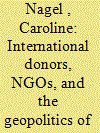| Srl | Item |
| 1 |
ID:
168630


|
|
|
|
|
| Summary/Abstract |
The study of political leadership in Lebanon has most often revolved around the questions of the attributes and networks of leaders commonly considered within the frame of patron–client relations. In this empirical article, I propose to shift the focus towards the dynamics of identification at the centre of the nexus between leaders and followers. Focusing on the case of the recently elected president of the Republic, Michel Aoun, I draw on testimonies collected among his supporters to expose how his character instigates acts of affective memorialization. Voicing manifold social inspirations, both private and collective, these memory practices anchor the attachment to the leader into multiple temporalities and emphasize contrasts with alternate repulsive figures to perform social bonds and boundaries. The stories composed around this cast of characters illuminates the historical as well as emotional processes at the heart of political identification in Lebanon.
|
|
|
|
|
|
|
|
|
|
|
|
|
|
|
|
| 2 |
ID:
138975


|
|
|
|
|
| Summary/Abstract |
In the aftermath of 9/11, Western states have increasingly used the promotion of democracy and civil society as a means of effecting geopolitical aims in the Middle East. Democracy promotion has involved extensive financial support of local non-governmental organisations (NGOs) who work to instill (neo)liberal-democratic values and norms among populations that are seen to be lacking in these. This article, in examining the production of citizenship as a geopolitical practice, brings critical-geography scholarship into conversation with the critical literature on Western-funded civil society in ‘transitional’ societies. We focus on the case of Lebanon, which has been targeted by Western donors due to its strategic importance in deepening regional geopolitical rivalries. We highlight the pervasiveness of Western democracy discourses in the work of local NGOs, and especially the tendency to view sectarian politics as a source of instability that must be sublimated by new forms of societal consensus. But our account also highlights the scepticism that NGO directors feel toward their own efficacy and toward the influence of Western donors in Lebanese society. Their critical assessments of Western-funded civil society call into question the extent to which democracy promotion can secure Western geopolitical interests, much less enforce Western political supremacy.
|
|
|
|
|
|
|
|
|
|
|
|
|
|
|
|